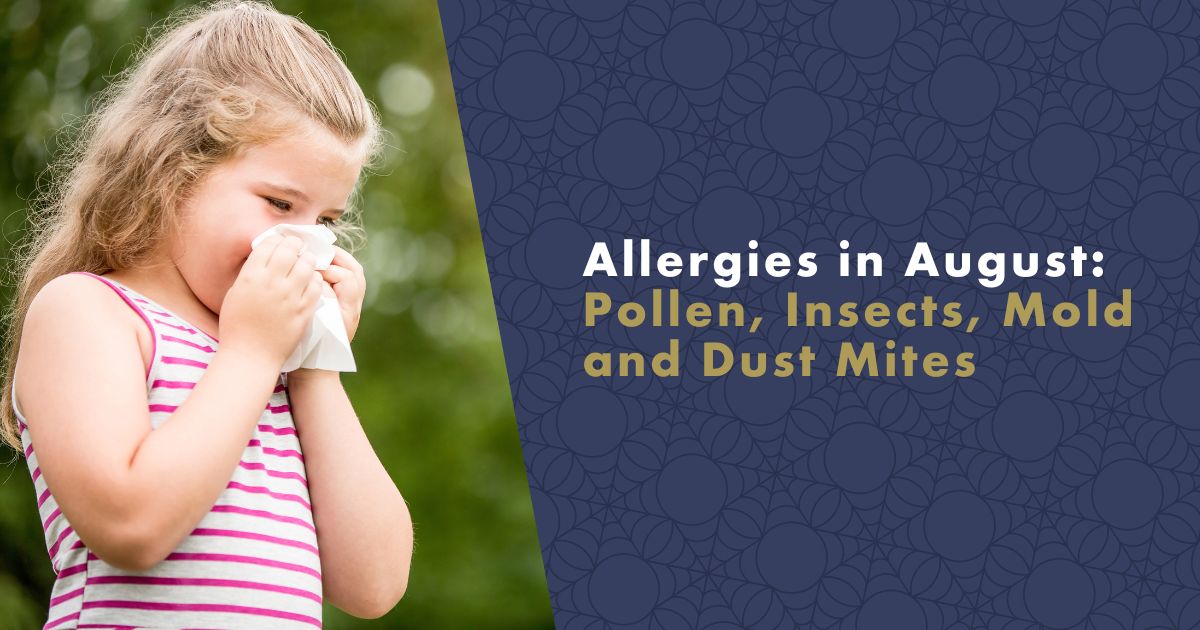During the summer, there are plenty of allergens around us that cause various allergic reactions in many people. The month of August is no exception, and together, we will look at the most common allergens and the associated allergy symptoms, as well as how to protect ourselves from allergens. However, the good news is that you won't be bothered by tree pollens anymore, as they are already past their blooming season.

Recognizing Allergic Reactions
Have you noticed that in certain situations, such as when you come into contact with animals or during a specific season, you experience atypical symptoms like itching, shortness of breath, swelling, runny nose, or sneezing? It's likely that you are experiencing an allergic reaction.
Allergy is a unique response of our immune system to substances that are harmless to most people. When our body encounters an allergen, it triggers an allergic reaction, which can manifest in different ways because each person may have different sensitivities to various allergens and the manifestation of allergies can vary in severity and symptoms.
TIP: Sun allergy, how to recognize and how to treat? Read about it on our blog.
Most Common Allergens in August
For many, August is a time for summer fun in the gardens or by the pools, but for others, it comes with the inconvenience of allergies. Let's take a look at the most common allergens in August.
Plant Pollen: Plants release their pollen into the air and can trigger allergic reactions in sensitive individuals. Some of the well-known allergenic plants include mugwort, hops, fescue, couch grass, clover, ribleaf, melissa, meadow-grass, and other grasses.
Molds: Molds are microscopic fungi that thrive in various environments. In August, molds are often found in humid and warm places, such as bathrooms, cellars, or gardens.
Dust Mites: Dust mites are microscopic organisms that can be found both indoors and outdoors. In August, dust mites can multiply in humid environments and cause allergic reactions. The main allergens are dust mite excrement, which contains allergenic substances.

Insects: There are several types of insects that can cause allergic reactions to their stings during the summer months. The most common ones are stinging insects such as bees, wasps, hornets, and mosquitoes.
Common Allergy Symptoms
There are many allergic symptoms that can manifest differently in each person and to varying degrees. The most common allergy symptoms include:
- Runny and stuffy nose,
- itchy and burning eyes,
- itchy skin and rash,
- sneezing, coughing, and shortness of breath.
Specific Allergic Symptoms in August
Among the main allergens in August are pollen, molds, and dust mites. Each of these allergens can result in different allergic symptoms.
Symptoms of grass pollen allergy usually affect the respiratory system and eyes. Allergic reactions to pollen may include runny nose, sneezing, itching of the nose, and eyes. People allergic to molds may also experience breathing difficulties and itchy skin, as well as increased fatigue. Allergies to dust mites can cause breathing problems and shortness of breath, as well as itching and rashes on the skin, which are easily noticeable.

TIP: What is solar eczema? Read about it in our article.
How to Protect Yourself from Allergies in August
There are several ways to minimize allergic symptoms and protect yourself in August. Here are some useful tips:
- Limit contact with allergens: As a first step, you can avoid exposure to as many allergens as possible. Avoid visiting blooming meadows and places with the highest concentration of pollen, dust, or mold. Wearing a nanomask or using a small personal air purifier around your neck can help you to effectively clean the air in your immediate surroundings.
- Stay informed with current information: Find out what allergens are currently present in your area and check the current pollen situation. There are websites and mobile apps that allow you to monitor pollen concentrations.
- Keep your home free of allergens: It's essential to maintain a space where you spend the most time as allergen-free as possible. Using an air purifier for allergy sufferers and dehumidifiers can significantly help to reduce dust, pollen, mites, and molds in the air. Additionally, regular floor cleaning and using the right cleaning products can be beneficial. Be cautious with food storage to avoid having moldy food at home.
- Avoid high grassy areas: During outdoor activities, try to avoid high grassy areas and meadows, as they have the highest concentration of pollen. Also, consider reducing gardening activities when there's an increased pollen concentration in the air.
- Use insect repellent: To protect yourself from insects, use quality repellents and wear long clothing, especially in areas where insects are most prevalent. You can also install window screens at home to keep them from getting inside.
#produkty#https://www.nanospace.store/nasal-sprays/
Learn More about Allergies
Frequently Asked Questions (FAQ)
1. How long do allergic reactions last in August?
The duration of allergic reactions varies for each person and depends on the severity of the allergy. Some individuals may experience symptoms for only a short period, while others may have symptoms throughout August.
2. Can adults develop allergies even if they were not allergic before?
Yes, it is possible for allergies to develop later in life. This may be due to changes in the immune system or exposure to new allergens.
3. What is the difference between allergies and a common cold?
Allergic reactions and common colds can have similar symptoms, such as a runny nose, cough, and sneezing. However, the difference lies in their causes. Allergies are caused by an overreaction of the immune system to allergens, while the common cold is caused by a viral infection.
4. Can August allergies affect my work performance?
Yes, if you have severe symptoms, you may feel tired, have difficulty concentrating, and experience reduced productivity. It is essential to seek medical help and find ways to minimize the impact of allergies on your daily activities.
5. Is it possible to cure allergies?
Allergies cannot be completely cured, but proper treatment and prevention can significantly reduce their impact on your life. It is essential to collaborate with a doctor, follow recommendations, and minimize contact with allergens.
6. Can an air purifier help reduce allergies?
Yes, an air purifier can help reduce allergies by filtering the air and removing allergens such as pollen, molds, and dust mites. Air purifiers with HEPA filters are effective tools for improving air quality in rooms and minimizing allergic reactions.
7. How does the HEPA filter work in an air purifier?
The HEPA filter (High-Efficiency Particulate Air) is a very dense filter that captures up to 99.97% of particles sized 0.3 micrometers and larger. This includes allergens like pollen, molds, dust mites, and other impurities. Air purifiers with HEPA filters can remove allergens from the air, minimizing allergic reactions.
8. Are air purifiers suitable for all types of allergies?
Air purifiers with HEPA filters are effective in removing solid allergens from the air, such as pollen, molds, and dust mites. However, they may be less effective for certain allergens, such as animal-derived substances or chemicals. Individuals with allergies should choose an air purifier that best suits their specific needs.
Sources
- D'amato, G., Spieksma, F.T.M., Liccardi, G., Jäger, S., Russo, M., Kontou‐Fili, K., Nikkels, H., Wüthrich, B. and Bonini, S., 1998. Pollen‐related allergy in Europe. Allergy, 53(6), pp.567-578.
- Miller, J.D., 2019. The role of dust mites in allergy. Clinical reviews in allergy & immunology, 57(3), pp.312-329.
- Golden, D.B., 2017. Insect allergy. In Middleton's allergy essentials (pp. 377-393). Elsevier.
- Tracy, J.M., 2011. Insect allergy. Mount Sinai Journal of Medicine: A Journal of Translational and Personalized Medicine, 78(5), pp.773-783.
- Twaroch, T.E., Curin, M., Valenta, R. and Swoboda, I., 2015. Mold allergens in respiratory allergy: from structure to therapy. Allergy, asthma & immunology research, 7(3), pp.205-220.
- Portnoy, J.M. and Jara, D., 2015. Mold allergy revisited. Annals of Allergy, Asthma & Immunology, 114(2), pp.83-89.

